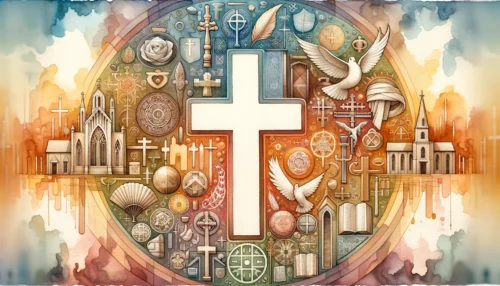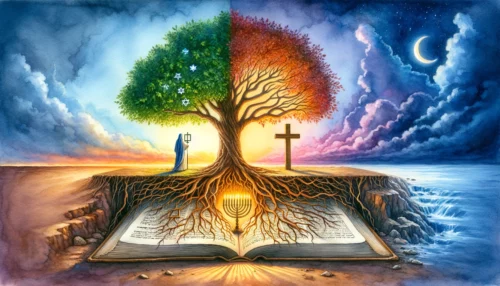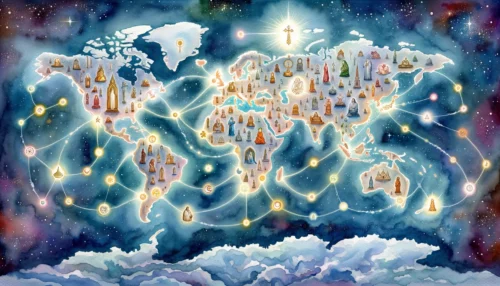The Bible is filled with stories of God’s interactions with the nation of Israel, and many people have been left curious about the significance of this particular nation in God’s plan. In this article, we’ll explore the biblical reasons behind Israel’s chosen status, helping you gain a better understanding of this fascinating subject. Get ready to dive into a biblical journey as we unfold the mysteries behind God’s choice of Israel. By the end of this article, you’ll have a greater appreciation for the role Israel plays in God’s divine plan.
A Covenant with Abraham: The Roots of God’s Choice
The story of God choosing Israel as His chosen people starts with a man named Abraham. According to the biblical narrative, God called Abraham, then known as Abram, to leave his homeland of Ur in Mesopotamia and venture into an unknown land (Genesis 12:1). This call marked the beginning of a special relationship between God and Abraham, which would ultimately lead to the formation of the nation of Israel.
God made a covenant with Abraham, promising him numerous descendants and the land of Canaan as an inheritance (Genesis 12:2-3; 15:18). This covenant was based on God’s grace and was unconditional, meaning that it did not depend on Abraham’s performance or obedience. God chose Abraham and his descendants to be a blessing to all the families of the earth. In Genesis 12:3, God says, “I will bless those who bless you, and whoever curses you I will curse; and all peoples on earth will be blessed through you.”
As Abraham’s descendants multiplied, they eventually became the twelve tribes of Israel, named after Abraham’s grandson, Jacob, who was later renamed Israel (Genesis 32:28). The nation of Israel was formed through these twelve tribes, and it was through this nation that God continued to fulfill His promises to Abraham.
The covenant with Abraham was further reaffirmed through his son Isaac (Genesis 26:3-5) and grandson Jacob (Genesis 28:13-15). These patriarchs, along with their descendants, were chosen by God to carry out His divine plan. God’s choice of Israel was not based on their merit, but on His love, mercy, and faithfulness to His promises (Deuteronomy 7:6-8).
It is important to note that the covenant with Abraham was not limited to the physical descendants of Israel but was open to all who would place their faith in God (Genesis 17:7). Throughout history, many non-Israelites joined the nation of Israel and became part of God’s chosen people. This demonstrates that God’s plan of redemption has always been inclusive, and His choice of Israel was a means to bring salvation to the entire world.
The roots of God’s choice of Israel as His chosen people can be traced back to His covenant with Abraham. This covenant, based on God’s grace, set the stage for the formation of the nation of Israel and the ultimate fulfillment of God’s plan to bless all the families of the earth.
Israel’s Role as a Witness to the Nations
God’s choice of Israel as His chosen people was not only about the fulfillment of His promises to Abraham and his descendants, but also about Israel’s role in demonstrating God’s power, love, and faithfulness to the rest of the world. Israel was to be a light to the nations, witnessing to God’s character and His redemptive plan for all of humanity (Isaiah 42:6).
One of Israel’s primary roles as God’s chosen people was to uphold the Law that God had given them through Moses at Mount Sinai (Exodus 19:5-6). The Law included the Ten Commandments and various other moral, civil, and ceremonial regulations. By adhering to these laws, Israel was to show the world what it meant to live in a close relationship with the one true God. The Law also provided a framework for Israel’s worship, emphasizing the importance of holiness, justice, and compassion (Deuteronomy 4:5-8).
Unfortunately, Israel often failed to live up to their calling as God’s chosen people. They struggled with idolatry, disobedience, and unfaithfulness to God throughout their history. Despite their shortcomings, God continued to love and forgive Israel, using their failures as an opportunity to demonstrate His mercy and grace (Hosea 11:8-9).
God also chose Israel to be the vehicle through which He would reveal His Word to the world. The Scriptures, which make up the Old Testament, were primarily written by Israelites under divine inspiration (2 Timothy 3:16). These sacred writings contain God’s revelation of Himself, His will, and His plan for the redemption of humanity. Through the Scriptures, Israel was to communicate God’s truth to the nations, inviting them to enter into a relationship with the Creator.
In addition to being custodians of God’s Law and His Word, Israel was to serve as an example of God’s faithfulness and protection. Throughout their history, Israel experienced God’s intervention in times of crisis, such as their deliverance from slavery in Egypt (Exodus 14-15), their conquest of the Promised Land (Joshua 1-12), and their return from exile in Babylon (Ezra 1-6). These events were a testament to God’s unwavering commitment to His chosen people and served as a witness to the nations of His power and love.
Israel’s role as God’s chosen people involved serving as a witness to the nations, demonstrating God’s character and redemptive plan through their adherence to the Law, their preservation of the Scriptures, and their experiences of God’s faithfulness and protection. Despite their failures, Israel’s unique relationship with God remains an important testament to His mercy, grace, and love for all of humanity.
The Messianic Line: A Promise Fulfilled
Another critical aspect of God’s choice of Israel as His chosen people is their role in the lineage of the Messiah, Jesus Christ. The Old Testament is filled with prophecies that foretell the coming of a Messiah, a redeemer who would save humanity from sin and establish God’s kingdom on earth. These prophecies were ultimately fulfilled through Jesus, who was born into the nation of Israel, as a descendant of Abraham, Isaac, and Jacob (Matthew 1:1-17).
The promise of the Messiah was first given to Abraham when God told him that “all peoples on earth will be blessed through you” (Genesis 12:3). This promise was later echoed in the prophecies of the Old Testament, which foretold that the Messiah would come from the line of King David, a descendant of Abraham (2 Samuel 7:12-13; Isaiah 11:1). Jesus’ birth in Bethlehem, as a member of the tribe of Judah and a descendant of David, fulfilled these prophecies and confirmed Israel’s role in God’s plan of redemption (Luke 2:4-7; Romans 1:3).
Jesus’ ministry, death, and resurrection were the culmination of God’s redemptive plan for humanity, offering salvation to both Jews and Gentiles alike (John 3:16; Ephesians 2:11-22). Through Jesus, the blessings promised to Abraham and his descendants were extended to all people, regardless of their nationality or heritage. This reaffirms the inclusive nature of God’s plan and highlights the central role of Israel in the story of redemption.
The fulfillment of the Messianic prophecies in Jesus also serves as a testament to the reliability of the Scriptures and the faithfulness of God to His promises. Throughout history, God continued to guide and preserve the nation of Israel, ensuring the arrival of the Messiah in accordance with His divine plan. This demonstrates God’s unwavering commitment to His chosen people and His desire to bring salvation to the world.
The Messianic line is a crucial aspect of God’s choice of Israel as His chosen people. Through the nation of Israel, Jesus, the long-awaited Messiah, was born, fulfilling the prophecies of the Old Testament and bringing salvation to all of humanity. This underscores the central role of Israel in God’s plan of redemption and showcases His faithfulness to His promises throughout history.
Embracing the Legacy of God’s Chosen People
The biblical narrative provides a rich and multifaceted understanding of why God chose Israel as His chosen people. From the covenant with Abraham to Israel’s role as a witness to the nations and the fulfillment of the Messianic prophecies, Israel’s unique place in God’s plan of redemption is evident. As we reflect on the story of Israel, we can gain a deeper appreciation for God’s love, mercy, and faithfulness to His promises.
Consider these questions for further reflection:
- How does understanding Israel’s role in God’s plan of redemption influence your perspective on the biblical narrative?
- In what ways can the story of Israel inspire you to trust in God’s faithfulness to His promises in your own life?
- How can you apply the lessons learned from Israel’s experiences as God’s chosen people to your own walk of faith?
As we embrace the legacy of Israel as God’s chosen people, let us be inspired by their journey, drawing strength from God’s unwavering commitment to His promises. May the story of Israel serve as a reminder that God’s love and grace extend to all people, inviting each of us to be part of His redemptive plan.














